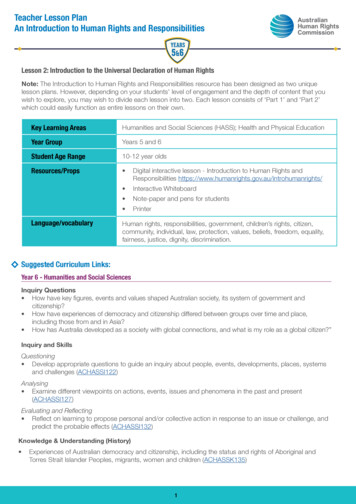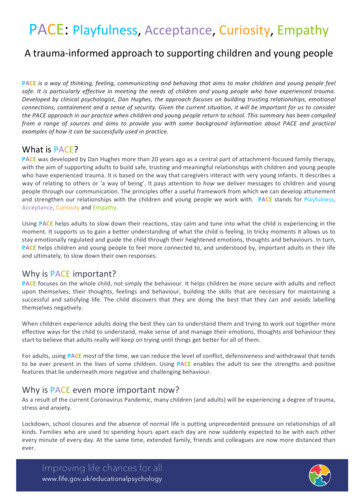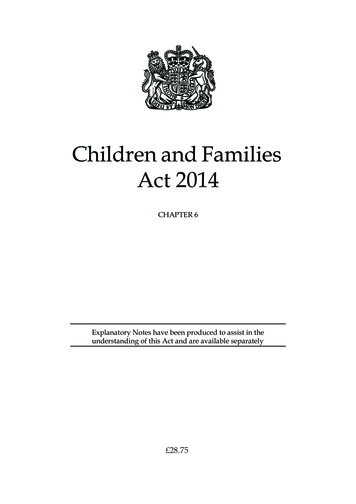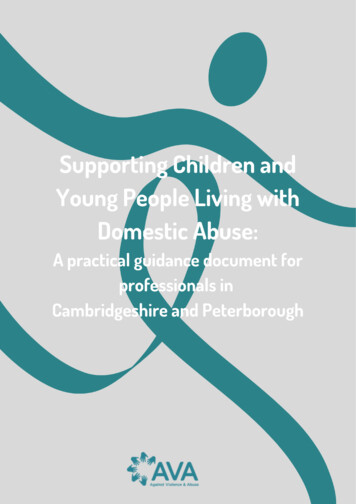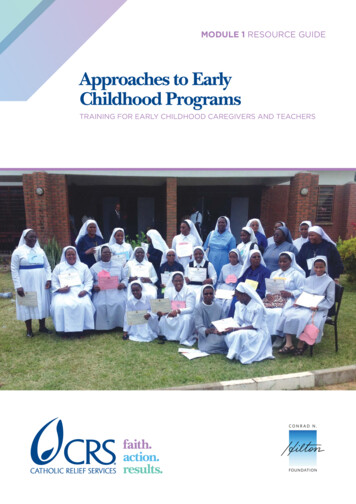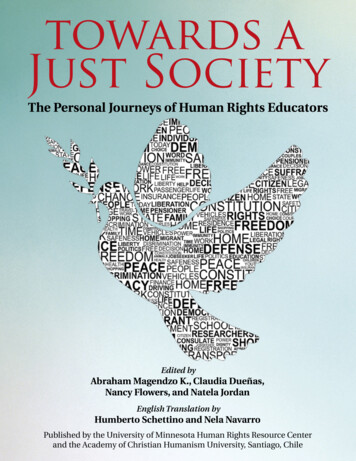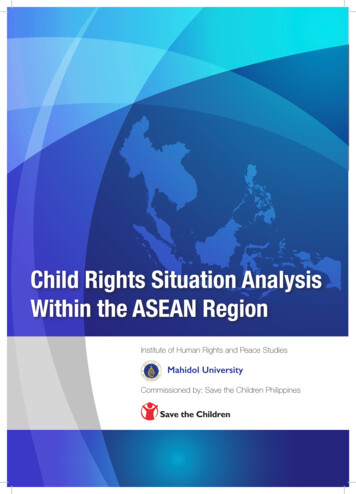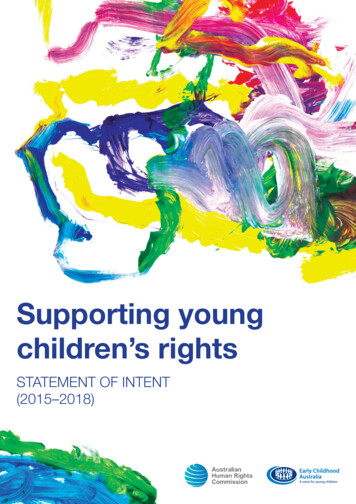
Transcription
Supporting youngchildren’s rightsSTATEMENT OF INTENT(2015–2018)
The Australian Human Rights Commissionwas established in 1986 by an act of the federalParliament. We are an independent statutoryorganisation and report to the federal Parliamentthrough the Attorney-General.Our Vision: Human rights—everyone, everywhere,everyday.Early Childhood Australia (ECA) has been avoice for young children since 1938. We are thepeak early childhood advocacy organisation,acting in the interests of young children, theirfamilies and those in the early childhood field.ECA advocates to ensure quality, social justiceand equity in all issues relating to the educationand care of children aged birth to eight years.Our vision: Every young child isthriving and learning.
PurposeSupporting young children’s rights: Statement ofintent (2015–2018) provides high-level principlesand areas for collective work, advocacy andaction by Early Childhood Australia (ECA),its members and the National Children’sCommissioner in relation to the rights of youngchildren—including children from birth to primaryschool age—over the next three years.Supporting young children’s rights: Statement ofintent (2015–2018) assists ECA and its membersto be clear and credible advocates in campaigningfor the rights and wellbeing of young children(ECA, 2014). ECA and the National Children’sCommissioner have worked collaboratively toidentify key areas for action to advocate for youngchildren’s rights in Australia. This document alsoaims to guide professionals working with youngchildren to support and advocate for youngchildren’s rights in their day-to-day practice.OverviewAustralia ratified the United Nations Convention onthe Rights of the Child in 1990 (the ‘Convention’or ‘UNCRC’). This Convention is an internationalhuman rights treaty which formally and explicitlyoutlines the rights of children in international lawincluding basic human rights such as the rightto be free from abuse, neglect and exploitation,the right to an education and healthcare andthe right to be free from discrimination of anykind. The Convention emphasises respectfor the inherent human dignity of all children,the importance of recognising diversity—including learning styles, abilities, gender, familycircumstances and geographic location—andthe principles of non-discrimination, bestinterests of the child, participation and survivaland development. Whilst the Convention is notincorporated as a whole into Australian nationaland state laws, its principles inform and guidecomponents of various legislation, policy, serviceprovision and practice.Of particular note to the development of thisdocument, the national legislative framework forearly childhood service delivery, the Educationand Care Services National Law (2010) explicitlysupports the incorporation of the Convention intolegislation in Australia. Similarly the Early YearsLearning Framework (2009) explicitly incorporatesthe Convention into the national guide forcurriculum decision-making in early education andcare. These documents highlight the central roleof young children’s rights in the provision of qualityteaching and learning and service delivery.Early childhood educators guided by the [EarlyYears Learning Framework] will reinforce intheir daily practice the principles laid out in theUnited Nations Convention on the Rights of theChild. The Convention states that all childrenhave the right to an education that lays afoundation for the rest of their lives, maximisestheir ability, and respects their family, culturaland other identities and languages. TheConvention also recognises children’s right toplay and be active participants in all mattersaffecting their lives.The Early Years LearningFramework, 2009, p. 5.The articles within the UNCRC are embeddedwithin the objectives and guiding principles ofthe Education and Care Services National Law(2010) and Regulations (2011). The objectivesand guiding principles of the Education and CareServices National Law (2010) provide the purposeof the Act. Of note are the following relevant keyguiding principles (Section 3): that the rights and best interests of the childare paramount that children are successful, competent andcapable learners that the principles of equity, inclusion anddiversity underlie this Law that Australia’s Aboriginal and Torres StraitIslander cultures are valued that the role of parents and families arerespected and supported that best practice is expected in the provision ofeducation and care services.SUPPORTING YOUNG CHILDRENS RIGHTS—STATEMENT OF INTENT (2014–2018) 1
Why do we need a jointstatement of intent?As a national legislative framework and policydocument the Education and Care National Law(2010) and the Early Years Learning Framework(2009) explicitly incorporate the UNCRC andhighlight the central role of children’s rights inthe provision of quality teaching, learning andmainstream service delivery.Areas for actionAustralia’s first National Children’s Commissioner,Ms Megan Mitchell, tabled her inaugural report—the Children’s Rights Report 2013—to Parliamentin November 2013. This report examined theimplementation of the UNCRC in Australia. Inthis report the National Children’s Commissioneridentified five emerging themes to progress thebetter protection of children’s rights in Australia.The above key documents and these five themeshave informed the focus of ECA’s Supportingyoung children’s rights: Statement of intent(2015–2018).Key documentsOur statement of intent is based on an analysisand review of the following key Australian childrights documents: Education and Care Services National Law(2010) and the Education and Care ServicesNational Regulations (2011) Belonging, Being and Becoming—The EarlyYears Learning Framework for Australia (2009)and My Time, Our Place—Framework for SchoolAge Care In Australia (2011) United Nations Convention on the Rights of theChild (1989) Children’s Rights Report (2013) UN Committee on the Rights of the Child:Concluding Observations, Australia (2012) Listen to Children Report (2011) National Framework for Protecting Australia’sChildren 2009–2020 (2009) Investing in the Early Years—A National EarlyChildhood Development Strategy 2009–2020(2009)The five key themes include: ECA Code of Ethics (2006) the right to be heard ECA Reconciliation Action Plan (2012) freedom from violence, abuse and neglect A Guide to General Comment 7: ImplementingChild Rights in Early Childhood (2006) the opportunity to thrive engaged civics and citizenship action and accountability.2 SUPPORTING YOUNG CHILDRENS RIGHTS—STATEMENT OF INTENT (2014–2018)
1. The right to be heard:Promoting children’s voice and participation in decision-makingprocesses, and enabling greater opportunities to hear fromchildren about their concernsI would feel better if in life we kids had more of a say as we do have avoice and we would like to be heard and this is perfect for me as I ambeing heard. I would feel much better if everyone in life was equal.- child from Victoria- four-year-old girl from QueenslandThe key priority areas for action identified by ECAand the National Children’s Commissioner specificto young children for 2015–2018 include:Action 1.1: building early childhood professionals’capacity, skills and knowledge to work, think andbehave in a way that supports the implementationof children’s rights, including the right to expresstheir views, in everyday practice.Action 1.2: supporting professionals workingwith young children to recognise that all children,including very young children, have the right tobe heard and to participate in decision-makingprocesses.Action 1.3: supporting professionals workingwith young children to understand that they havethe responsibility to listen to children, considertheir opinions and act on their wishes, taking intoaccount the child’s best interests.Action 1.4: supporting professionals to be able toidentify and use appropriate resources and toolsto ethically facilitate children’s participation anddecision-making.SUPPORTING YOUNG CHILDRENS RIGHTS—STATEMENT OF INTENT (2014–2018) 3
4 SUPPORTING YOUNG CHILDRENS RIGHTS—STATEMENT OF INTENT (2014–2018) have privacy. know that my family is recognised andrespected as having the key responsibilityfor my upbringing be supported to access the informationI need to be safely connected to andcontribute to my world and the decisionsaffecting me be consulted in decisions about what isbest for me advocate for children’s views and opinionsto be heard and valued within the earlylearning environment, the family and thecommunity. listen to and value families’ views andopinions and show that their views havebeen acted on provide children with opportunities fortheir views to be heard and acted upon listen to and value children’s views andopinions and show that their views havebeen acted on facilitate learning environments that fosteropportunities for all children to expressthemselves build my capacity, skills and knowledgeof children’s rights to enable me toimplement these in my day-to-daypractice recognise children’s agency and theirindividual and evolving capacity toparticipate in day-to-day considerationsrelating to their lives be recognised as a successful,competent and capable learner be encouraged to express my views andopinions and know that these views andopinions will be listened to and valuedECA and the National Children’sCommissioner will:I will:I will: ethically contribute young children’svoices to the public debate on issues ofrelevance to young children. identify and promote the use ofappropriate resources and tools topromote children’s voices and to supportchildren’s participation in decision makingWhat this means for ECA and theNational Children’s CommissionerWhat this means for a professionalworking with young childrenWhat this means for a childThe right to be heard
SUPPORTING YOUNG CHILDRENS RIGHTS—STATEMENT OF INTENT (2014–2018) 5xx [particularly] Children are effective communicators.xx Children are confident and involved learnersxx Children have a strong sense of wellbeingxx Children are connected with and contribute to their worldxx Children have a strong sense of identity The Early Years Learning Framework (2009)—learning outcomes:xx has regard to the family and cultural values, age, and physical and intellectual development and abilities of each child being educatedand cared for by the service.xx gives each child positive guidance and encouragement toward acceptable behaviourxx maintains at all times the dignity and rights of each childxx allows children to undertake experiences that develop self-reliance and self-esteemxx encourages children to express themselves and their opinions Education and Care Services National Regulations (2011) Section 155—educators must provide education and care services to children ina way that: Education and Care Services National Law (2011) Section 3—children are successful, competent and capable learners. UNCRC Article 5, 18—Right to family. UNCRC Article 13—Right to freedom of expression. UNCRC Article 12—Right to respect for the views of the child.Relevant Articles and Acts
2. Freedom from violence, abuse and neglect:Delivering safe environments and respect for the dignity ofthe childI think that everyone should be safe.- 10 year old child from South Australia- five-year-old boy from New South WalesThe key priority areas for action identified by ECAand the National Children’s Commissioner specificto young children for 2015–2018 include:Action 2.1: supporting children’s services toconsider and build their organisational capacity tobecome child safe and child friendly organisations.Action 2.2: advocating that children’s servicessettings be free from harm.Action 2.4: improving interdisciplinary responsesacross education, health and social services tosupport vulnerable children and children at risk ofviolence, abuse and neglect.Action 2.5: supporting professionals workingwith young children to build strong partnershipswith families to provide a safe environment fortheir children.Action 2.3: promoting a better understandingwithin children’s services of child protectionissues, including the identification and supportof vulnerable children, children at risk and linkingat-risk children and families to appropriatesupports, early intervention and otherservices and responses.6 SUPPORTING YOUNG CHILDRENS RIGHTS—STATEMENT OF INTENT (2014–2018)
SUPPORTING YOUNG CHILDRENS RIGHTS—STATEMENT OF INTENT (2014–2018) 7 develop my understanding of risk andprotective factors that contribute tochildren’s safety as well as relevantlegislation and mechanisms for protectingchildren from violence, abuse and neglect be and feel safe no matter where I am be listened to and have my concernsheard, respected and acted upon. be cared for and have a home live and grow up safely be consulted in decisions about what isbest for me model respectful relationships. facilitate learning environments that fosteropportunities for all children to expressthemselves improve my understanding of each child’sfamily and support their connections withrelevant local services that support safeenvironments for children provide children with opportunities to raisetheir concerns about safety listen to children and recognise andrespond to signs of violence, abuse andneglectI will:I will: be supported and protected by thepeople in my life from violence, abuseand neglectWhat this means for a professionalworking with young childrenWhat this means for a childFreedom from violence, abuse and neglect advocate for the protection of all childrenfrom violence, abuse and neglect. promote appropriate strategies to supportprofessionals to identify and respond torisk, abuse and neglect support organisations providing servicesfor young children, to be child safe andchild friendlyECA and the National Children’sCommissioner will:What this means for ECA and theNational Children’s Commissioner
8 SUPPORTING YOUNG CHILDRENS RIGHTS—STATEMENT OF INTENT (2014–2018)xx Children are effective communicators.xx Children are confident and involved learnersxx [particularly] Children have a strong sense of wellbeingxx Children are connected with and contribute to their worldxx Children have a strong sense of identity The Early Years Learning Framework (2009)—learning outcomes: Education and Care Services Regulations (2011) Section 84—educators must be aware of the existence, application and obligationsunder state based child protection laws. Education and Care Services National Law (2010) Section 167—an approved provider and a nominated supervisor of an education andcare service must ensure that every reasonable precaution is taken to protect children being educated and cared for by the service fromharm and from any hazard likely to cause harm.xx any discipline that is unreasonable in the circumstances.xx any form of corporal punishment Education and Care Services National Law (2010) Section 166—an approved provider, a nominated supervisor, a staff member orvolunteer must ensure that no child being educated and cared for by the service is subjected to: UNCRC Articles 18, 33, 34, 37, 39—Right to protection.Relevant Articles and ActsFreedom from violence, abuse and neglect
3. The opportunity to thrive:Safeguarding the health and wellbeing of all children in Australia,including building an effective early intervention and preventionsystem; with a focus on the most vulnerable children—along thelines of proportionate universalismHelping poor children have a good house and have food that isgood to eat.- four-year-old girl from Victoria- three-year-old girl from South AustraliaThe key priority areas for action identified by ECAand the National Children’s Commissioner specificto young children for 2015–2018 include:Action 3.1: recognising Aboriginal and TorresStrait Islander children as children indigenousto Australia.Action 3.2: promoting and supporting culturalawareness training and the importance ofconnections with country with educators, children,families and community.Action 3.4: advocating for and supportingvulnerable children and children at risk to havepriority of access to early childhood education andcare services.Action 3.5: supporting families to connectto professional services to maximisechildren’s opportunities.Action 3.6: promoting and advocating for childrento have play-based learning opportunities, leisureand rest.Action 3.3: advocating for a child’s right toaccess, participate and benefit from qualityeducation as identified under the UNCRC.SUPPORTING YOUNG CHILDRENS RIGHTS—STATEMENT OF INTENT (2014–2018) 9
10 SUPPORTING YOUNG CHILDRENS RIGHTS—STATEMENT OF INTENT (2014–2018) learn more about my culture and thecultures of the children and families withinmy community know that my family and my values, beliefs,culture, religion and values are recognisedand respected be given the opportunity, time and spaceto play and rest. have access to education, play and culturalactivities be consulted in decisions about what isbest for me support my engagement in lifelong learning support, promote and advocate forthe provision of play-based learningopportunities for children in early childhoodeducation and care settings. recognise children’s current capacity andabilities and support children to learn provide children with information relevantto their day-to-day lives in consultation withfamilies and based on the child’s evolvingcapacity and understanding facilitate a learning environment that willpromote opportunities for children to thriveand excel value quality resources that inform my workwith children and their families so that I amculturally sensitive and responsive commit to ongoing professionaldevelopment on cultural awarenessand approved learning frameworks foreducating children about culture anddiversity know, learn and understand the history ofAustralia’s first people be recognised as a successful, competentand capable learner be supported to know, enjoy, understandand express my culture, religion, languageand beliefsECA and the National Children’sCommissioner will:I will:I will: advocate for children to be given theopportunity, time and space to playand rest. continue their commitment to theReconciliation Action Plan and promotereconciliation across the early childhoodsector to close the gap in outcomesfor Aboriginal and Torres Strait IslanderchildrenECA will: inform organisations working with youngchildren of relevant evidence-basedpractice and research in relation tochildren’s rights. engage with recognised national andinternational experts in the field ofchildren’s rights so as to keep informedand up-to-date of changes relevant to theearly childhood education and care sectorWhat this means for ECA and theNational Children’s CommissionerWhat this means for a professionalworking with young childrenWhat this means for a childThe opportunity to thrive
SUPPORTING YOUNG CHILDRENS RIGHTS—STATEMENT OF INTENT (2014–2018) 11xx Children are effective communicators.xx [particularly] Children are confident and involved learnersxx Children have a strong sense of wellbeingxx Children are connected with and contribute to their worldxx Children have a strong sense of identity The Early Years Learning Framework (2009)—learning outcomes: Education and Care Services Regulations (2011) Section 84—educators must be aware of the existence, application and obligationsunder state based child protection laws. Education and Care Services Regulations (2011) Section 73, 74, 75 and 76—programming, assessment and documentation beimplemented and delivered by suitably qualified educators to contribute to the learning outcomes of each child attending an educationand care service. UNCRC Article 31—Right to play, rest and leisure. UNCRC Article 5,18—Right to family. UNCRC Articles 17—A right to information. UNCRC Articles 4, 42—A right to education.Relevant Articles and Acts
4. Engaged civics and citizenship:Through education and awareness of children and thecommunity about their rights and responsibilities in practical andmeaningful waysLife would be better for children and young people in Australia if we were alltreated with equality and we were all treated fairly. Life would be betterif everyone learned the meaning of freedom- 10 year old child from Victoria- four-year-old girl from South AustraliaThe key priority areas for action identified by ECAand the National Children’s Commissioner that arespecific to young children for 2015–2018 include:Action 4.1: supporting educators to providerights education in early childhood education andday-to-day practice.Action 4.2: supporting professionals to providechildren growing up in a digital world to engagein that world positively and to know about anddevelop basic skills in privacy preservation andinternet safety.Action 4.3: supporting professionals workingwith young children to recognise children asactive citizens who have a role in contributing totheir broader community whilst respecting andacknowledging each child’s evolving capacity.Action 4.4: supporting professionals working withchildren to create environments that are free ofbullying, both offline and online.12 SUPPORTING YOUNG CHILDRENS RIGHTS—STATEMENT OF INTENT (2014–2018)
SUPPORTING YOUNG CHILDRENS RIGHTS—STATEMENT OF INTENT (2014–2018) 13 build my capacity, skills and knowledgeof children’s rights to enable me toimplement these in my day-to-daypractice be informed about my rights andresponsibilities as a citizen within mycommunity know that my family is recognised andrespected as having the key responsibilityfor my upbringing. have my privacy protected be asked for my consent, and theconsent of my family, when sharingmy personal information, including myimages be supported to access the informationI need to be safely connected and tocontribute to my world be recognised as a participant in thedigital world respect relationships. value and respect diversity provide support to children, and theirfamilies, to promote children’s privacyand personal safety particularly in relationto digital technology used in the earlylearning environment, services for youngchildren and at home provide daily opportunities for children toexercise their rights and responsibilitiesin their early learning education andcare environment, their family and theircommunity keep informed and maintain resourcesthat will best support children’s learningon civic responsibly and children’s rights support children to know and understandtheir rights and responsibilitiesI will:I will: be provided with information and supportto engage in and exercise my civic rightsand responsibilitiesWhat this means for a professionalworking with young childrenWhat this means for a childEngaged civics and citizenship support and promote the ongoingdevelopment of national standards andethics in relation to children’s rights. promote and develop resources foreducators, professionals workingwith young children, children and thecommunity to promote children’s personalsafety, particularly in relation to digitaltechnology promote resources to support children’srights education in early childhood andwithin the communityECA and the National Children’sCommissioner will:What this means for ECA and theNational Children’s Commissioner
14 SUPPORTING YOUNG CHILDRENS RIGHTS—STATEMENT OF INTENT (2014–2018) National Quality Framework (2012) Standard 3.3.2—Children are supported to become environmentally responsible and show respect forthe environment.xx Children are effective communicators.xx [particularly] Children are confident and involved learnersxx Children have a strong sense of wellbeingxx Children are connected with and contribute to their worldxx Children have a strong sense of identity The Early Years Learning Framework (2009)—learning outcomes: Education and Care Services Regulations (2011) Section 84—educators must be aware of the existence, application and obligationsunder state based child protection laws. UNCRC Article 18—A right to privacy. UNCRC Articles 5, 18—Right to family. UNCRC Article 17—A right to information. UNCRC Articles 4, 42—Right to know your rights.Relevant Articles and ActsEngaged civics and citizenship
5. Action and accountability:Taking action to collect comprehensive national data about childwellbeing, progress a national vision for children, and developmechanisms by which children’s interests are systematicallyconsidered in law policy and practice development and reviewLife would be better for children if the government made sure every childhad all the rights. I think every child should have food and water- an Australian child- five-year-old boy from VictoriaThe key priority areas for action identified by ECAand the National Children’s Commissioner specificto young children for 2015–2018 include:Action 5.1: developing and supportingmechanisms to ethically contribute youngchildren’s voices to national data sets, laws, policyand day-to-day practices with children.Action 5.2: taking action to support the progressof a national vision for young children in Australia.SUPPORTING YOUNG CHILDRENS RIGHTS—STATEMENT OF INTENT (2014–2018) 15
16 SUPPORTING YOUNG CHILDRENS RIGHTS—STATEMENT OF INTENT (2014–2018) build my knowledge on how to ethicallyengage with young children and sharetheir contributions support children to have their views,experiences and achievements reflectedin national data sets advocate for engaging children ethicallyin data collection processes with theirongoing informed consent be informed about opportunities tocontribute to decisions, debates andresearch activities be informed about how my contributionswill impact on myself, my family and mycommunity know that my contributions are valued have privacy. be asked for my consent, and theconsent of my family, when sharingmy personal information, includingmy images be supported to access the informationI need to be safely connected and tocontribute to my world have a say about decisions affecting me take a critically reflective stance on myown professional practices with childrenand be amenable to feedback.I will:I will: be encouraged to express my views andopinions and know that these views andopinions will be listened to and valuedWhat this means for a professionalworking with young childrenWhat this means for a childAction and accountability advocate for ethical national and statebased data collection relating to children’sviews, experiences and opinions. promote children’s right to be involved indecision making and public debate aboutissues of relevance to them promote to children the available avenuesfor children to make a complaint abouttheir treatment ethically contribute young children’svoices to the public debate on issues ofrelevance to young children promote and develop resources tosupport educators to ethically engagewith young childrenECA and the National Children’sCommissioner commit to:What this means for ECA and theNational Children’s Commissioner
SUPPORTING YOUNG CHILDRENS RIGHTS—STATEMENT OF INTENT (2014–2018) 17xx Children are effective communicators.xx Children are confident and involved learnersxx Children have a strong sense of wellbeingxx [particularly] Children are connected with and contribute to their worldxx Children have a strong sense of identity The Early Years Learning Framework (2009)—learning outcomes:xx has regard to the family and cultural values, age, and physical and intellectual development and abilities of each child being educatedand cared for by the service.xx gives each child positive guidance and encouragement toward acceptable behaviourxx maintains at all times the dignity and rights of each childxx allows children to undertake experiences that develop self-reliance and self-esteemxx encourages children to express themselves and their opinions Education and Care Services National Regulations (2011) Section 155— educators must provide education and care services to childrenin a way that: Education and Care Services National Law (2011) Section 3—children are successful, competent and capable learners. UNCRC Article 18—A right to privacy. UNCRC Article 17—A right to information. UNCRC Article 4, 42—Right to know your rights. UNCRC Articles 5, 18—Right to family. UNCRC Article 13—Right to freedom of expression. UNCRC Article 12—Respect for the views of the child.Relevant Articles and Acts
GlossaryEducators: The Early Years Learning Framework(2009) describes educators as ‘early childhoodpractitioners who work directly with children inearly childhood settings’ (DEEWR, p. 45).Convention: A convention is an agreementbetween States (countries) covering particularmatters, especially one less formal than a treaty.Inclusion: The Early Years Learning Framework(2009) identifies that inclusion involves takinginto account all children’s social, cultural andlinguistic diversity (including learning styles,abilities, disabilities, gender, family circumstancesand geographic location) in curriculum decisionmaking processes. The intent is to ensure that allchildren’s experiences are recognised and valued.The intent is also to ensure that all children haveequitable access to resources and participation,and opportunities to demonstrate their learningand to value difference.Privacy: In this document privacy is intended toinclude consideration of children’s records andchildren’s personal information (verbal and written),children’s identity, photos and images beingprotected and kept safe. Privacy also includesadult and children’s consent being sought forthe sharing of information. The Privacy Act 1988defines privacy as ‘ information or an opinion,whether true or not, and whether recorded in amaterial form or not, about an identified individual,or an individual who is reasonably identifiable’.Common exam
SUPPORTING YOUNG CHILDRENS RIGHTS—STATEMENT OF INTENT (2014-2018) 1 Purpose Supporting young children's rights: Statement of intent (2015-2018) provides high-level principles and areas for collective work, advocacy and
